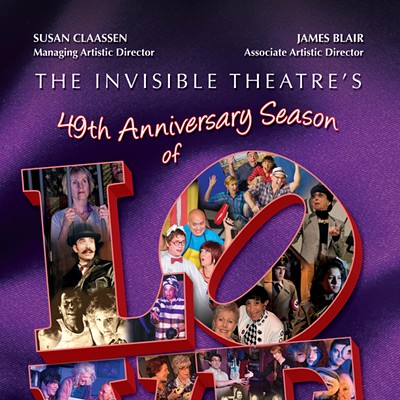Backstage comedies—the epitome of the genre being Michael Frayn's Noises Off—usually document the self-destruction of a show during a performance. Tom Dudzick's Don't Talk to the Actors hilariously chronicles a collapse way before the curtain rises. The show in question is so doomed that it begins to fall apart the minute the actors show up for their first table read.
Dudzick's play itself, in contrast, is tightly constructed, fitting six well-developed characters together so precisely that it's hard to imagine this show falling apart, especially in the confident, buoyant production it's enjoying at Invisible Theatre.
Jerry, a budding playwright, has brought his girlfriend, Arlene, to New York as he's about to get his first big Broadway break. They're both naïve and a bit star-struck; Arlene has tagged along to meet her idol, Curt Logan, a long-in-the-tooth TV actor who has been cast in Jerry's play, along with his bawdy former co-star, Beatrice Pomeroy, sort of a bargain-basement Fanny Brice. It is immediately apparent that Beatrice is all wrong for her role in Jerry's quiet little play; meanwhile, the smarmy Curt, while professing love for his part, tries to persuade Jerry to give it more "texture"—that is, make the character less milquetoast and more of a geriatric Stanley Kowalski.
Much trouble ensues when Jerry and Arlene break the one rule imposed by the show's avuncular director, Mike: Don't talk to the actors. Mike's implication is that conversation would only bother the actors, but the truth is that nothing good happens when the actors start talking back.
All of this is presided over from a corner by the obsessive-compulsive stage manager, Lucinda. She's the first character onstage, and Carrie Hill plays her with just the right degree of insufferable English primness, not to mention anal-retentive tension. Costumer Shana Nunez has decked her out in odd, mismatched black-and-white getups that gently mock the more coordinated real-life attire of the play's director, Susan Claassen. Not only does Claassen have a better eye for fashion than Lucinda; she has a fine sense of just how far she can push these characters without stripping them of their humanity. They don't engage in silly TV-sitcom double-takes; their gestures and inflections are based in the real world, which makes their fragile connection to that real world even funnier.
Naturally, actors who play hammy actors inevitably steal scenes, and nobody steals scenes with more gusto here than Liz McMahon as the brassy Beatrice. She enters late in the first act, but once she arrives, she takes the show hostage until intermission. McMahon's crass Beatrice, singing fragments of naughty songs and telling jokes that predate Cro-Magnon culture, is initially almost too much to bear, but later, she's allowed to develop some depth and nuance, and does so with great sensitivity.
Douglas Mitchell's Curt is suave and obviously insincere yet irresistibly charming, and it's wonderful to watch him attempt to seduce, in different ways, both Jerry and Arlene. Mitchell helps Curt get away with his naughty behavior, because he's not excessively flamboyant, even while managing to be just a bit bigger than life.
As Jerry and Arlene, the bumpkins from Buffalo, Eric Schumacher and Dallas Thomas are sweet, sincere, malleable and overwhelmed, all at once. Schumacher and Thomas neither let their characters run away from them nor blend in with the wallpaper, and through their control, they manage to hold their own among the flamboyant figures around them.
David Johnston plays Mike, the sensible director, as if he were an affable Midwestern hardware-store proprietor, with his actions daring to suggest that not quite everyone in theater is insane, while never, ever being boring—quite an achievement in these surroundings.
While Don't Talk to the Actors is well-stocked with funny lines and frantic moments, it's not the sort of comedy that lurches from joke to joke across the gaps where characters ought to be. The people on this stage are worth caring about, as written and as played.










